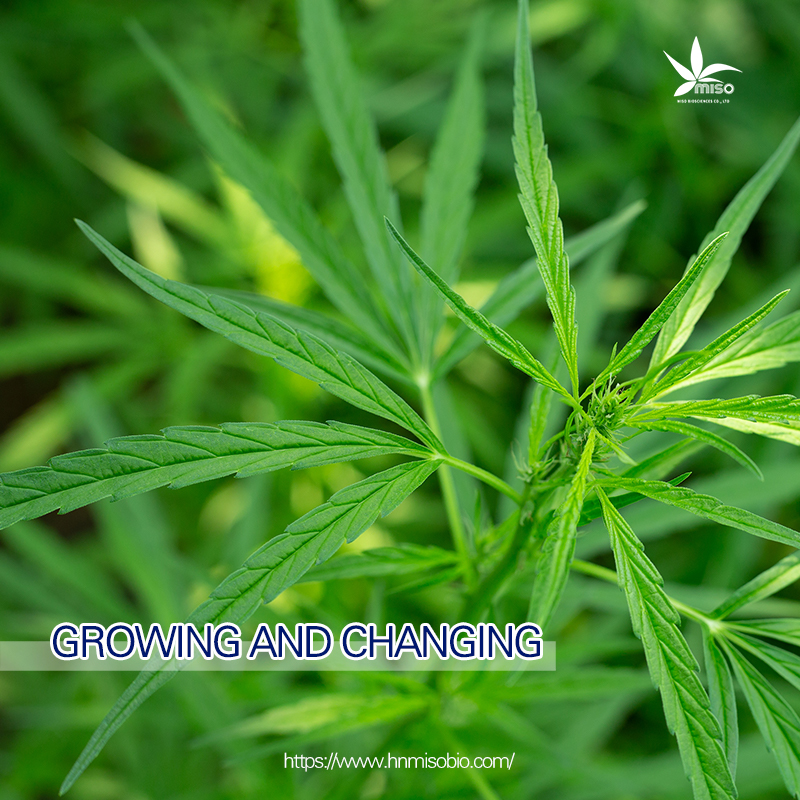CBG (Cannabigerol) is a cannabinoid found in the cannabis plant. It is a non-psychoactive compound and is often referred to as the "mother cannabinoid" because it is the precursor to many other cannabinoids, such as THC and CBD.
Characteristics of CBG:
1. Non-Psychoactive: Unlike THC (tetrahydrocannabinol), CBG does not produce a "high" or any psychoactive effects. This makes CBG a relatively safe, non-intoxicating compound, suitable for use in health and wellness products.

2. Role in the Cannabis Plant: CBG is typically present in its acidic form (CBGA) during the early stages of the cannabis plant’s growth. As the plant matures, CBGA is converted into other cannabinoids like THCA (precursor to THC) and CBDA (precursor to CBD). Therefore, CBG is found in higher concentrations in younger plants, but as the plant matures, its CBG content decreases.
3. Broad Potential: In recent years, CBG has attracted significant interest in the scientific community. Research suggests that CBG may have a variety of biological activities, including anti-inflammatory, antibacterial, and potentially anticancer properties, among other health benefits.
Potential Health Benefits of CBG:
Although research is still in the early stages, some preliminary studies and experiments suggest that CBG may offer the following health benefits:

1. Anti-Inflammatory Properties: CBG has anti-inflammatory effects and may help alleviate health issues caused by inflammation, such as arthritis and gastrointestinal diseases like Crohn's disease.
2. Antibacterial Properties: Some studies show that CBG has antibacterial effects against a variety of bacteria, including antibiotic-resistant strains, which may make it useful in treating infections.
3. Neuroprotective Effects: CBG may have protective effects on the nervous system, potentially helping to prevent neurodegenerative diseases like Parkinson’s disease and Alzheimer's disease. Early studies suggest that CBG may protect nerve cells by reducing oxidative stress and inflammation.
4. Anticancer Potential: Some laboratory studies suggest that CBG may inhibit the growth of cancer cells, particularly in types such as colon cancer and breast cancer. While these results are promising, further clinical research is needed to confirm this potential.
5. Relieving Anxiety and Stress: Similar to CBD, CBG may have potential for reducing anxiety and stress, which could benefit mental health.
6. Appetite Stimulation: Like THC, CBG may help stimulate appetite, making it potentially useful for conditions involving appetite loss, such as cancer or other diseases that cause weight loss.
Applications of CBG:
1. Health Supplements: Due to its potential health benefits, CBG has entered the market as a supplement, typically available in oils, capsules, or tinctures. It can be combined with CBD or other cannabinoids to provide synergistic effects.
2. Skincare Products: CBG is also being added to skincare products due to its anti-inflammatory and antioxidant properties, which may help alleviate skin conditions such as acne or other inflammatory skin issues.

3. Pharmaceutical Research: CBG's antibacterial, anticancer, and neuroprotective properties make it an important area of research for pharmaceutical development. While most current research is in the lab stage, CBG's clinical applications look promising.
Conclusion:
CBG (Cannabigerol), as a non-psychoactive natural cannabinoid, holds a variety of potential health benefits, including anti-inflammatory, antibacterial, neuroprotective, and anticancer effects. Although the existing research is promising, more clinical studies and evidence are needed before CBG can be widely used in therapeutic or health products. As cannabinoid research continues to advance, CBG could become an important health component in the cannabis industry.